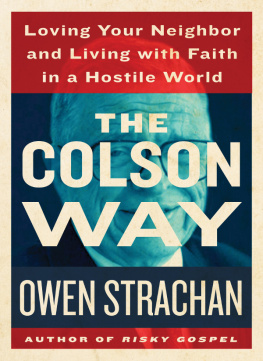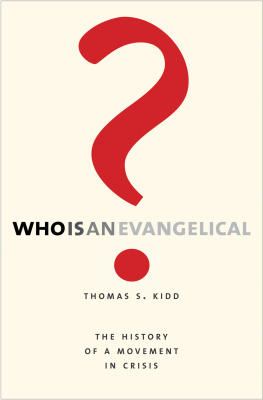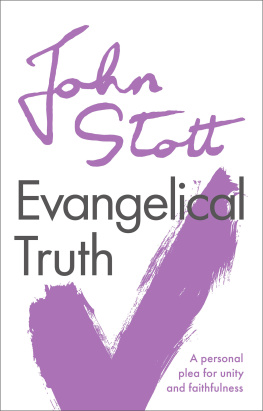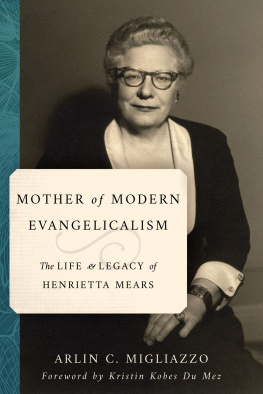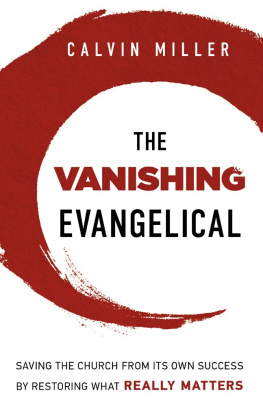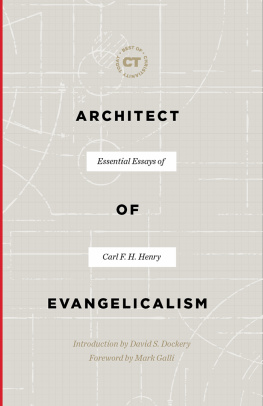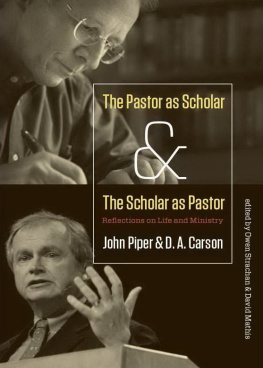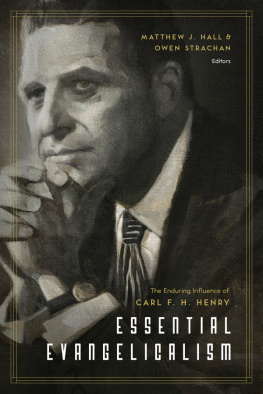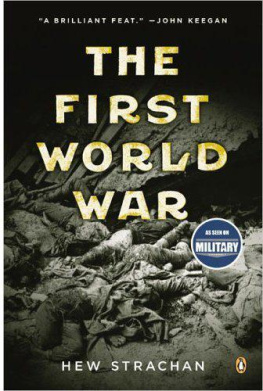Owen Strachans excellent work on the development of twentieth-century classical evangelicalism is illuminating and even inspirational. It also is realistic about the barriers that can block our best intentions. But in the end I was impressed that we dont have the same godly ambition today as leaders such as Harold John Ockenga, Carl Henry, Billy Graham, and (in the UK) John Stott. The account is convicting and motivating.
TIM KELLER, Senior Pastor, Redeemer Presbyterian Church, New York City
Owen Strachan provides an admirable account of one of the most important developments in twentieth-century American evangelical thought. Beginning in the 1940s, Harold Ockenga, pastor of Park Street Church in Boston, mobilized mostly younger evangelical scholars to form a self-conscious intellectual community. The ensuing renewal of evangelical intellectual life provided an important dimension for the new evangelical movement associated with Billy Graham and continues to have significant effects through the institutions shaped by that generation. Strachan introduces new material for telling this story and tells the story well.
GEORGE MARSDEN, Emeritus Professor of History, Notre Dame University
Studded with rich insights, Awakening the Evangelical Mind is a page-turning book that chronicles the efforts of Harold Ockenga, Carl F. H. Henry, Kenneth S. Kantzer, Billy Graham, and others to reinvigorate the evangelical mind after World War II. Author Owen Strachan helps his readers to sense the joys and poignant disappointments of these men as they pursued their important campaign. Based on previously unexploited archives, this is a study no student of the American evangelical movement can afford to miss.
JOHN WOODBRIDGE, Research Professor of History, Trinity Evangelical Divinity School
Owen Strachan locates the birth of neo-evangelicalism in an improbable place: along the banks of the Charles River, in Harvards hallowed halls and Bostons venerable Park Street Church. There, during the era of World War II, a formidable group of Boston scholars dreamed of fashioning an intellectually powerful movement that could help reach America for Christ. Anyone wanting to understand the continuing strength of evangelical faith in America should read this fascinating book.
THOMAS KIDD, Professor of History, Baylor University
Owen Strachan has given us a remarkable account of the neo-evangelical movement and the formation of evangelical scholarship as it developed in the middle of the twentieth century. Strachans brilliantly researched and carefully written work offers us much more than a recounting of this important movement. Through the eyes of Harold Ockenga, Carl Henry, E. J. Carnell, and others, Awakening the Evangelical Mind provides us with fresh insights into the shaping of relationships, the formationand attempted formationof important institutions, and an even-handed analysis of the accomplishments and setbacks of those who were at the center of these most significant days in the history of the American evangelical movement. We salute Owen Strachan for this masterful contribution!
DAVID S. DOCKERY, President, Trinity International University
In this well-researched and beautifully crafted book, Owen Strachan introduces us to a remarkable group of mid-twentieth-century evangelicals whose passion for recovering the life of the mind helped to reshape the modern evangelical movement. Rather than abandoning the academy, as some had done in the immediate past, they enthusiastically embraced it and inspired growing numbers of bright, well-educated young evangelicals to do likewise. Awakening the Evangelical Mind offers a timely and important corrective to some of the popular misconceptions about modern evangelicalism, and it issues a fresh challenge to contemporary evangelical Christians to take up that important task yet again.
GARTH M. ROSELL, Professor of Church History, Gordon-Conwell Theological Seminary
ZONDERVAN
Awakening the Evangelical Mind
Copyright 2015 by Owen Strachan
ePub Edition August 2015: ISBN 978-0-310-52080-1
Requests for information should be addressed to:
Zondervan, 3900 Sparks Dr. SE, Grand Rapids, Michigan 49546
Library of Congress Cataloging-in-Publication Data
Strachan, Owen.
Awakening the evangelical mind : an intellectual history of the neo-evangelical movement / Owen Strachan.
pages cm
Includes bibliographical references and index.
ISBN 978-0-310-52079-5 (hardcover, jacketed)
1. Evangelicalism United States. 2. Ockenga, Harold John, 1905-1985. 3. Henry, Carl F. H. (Carl Ferdinand Howard), 1913-2003. 4. United States History20th century. I. Title.
BR1642.U5S77 2015
277.3'082dc23
2015013918
All Scripture quotations, unless otherwise marked, are taken from The Holy Bible, English Standard Version, copyright 2001 by Crossway Bibles, a division of Good News Publishers. Used by permission. All rights reserved.
Scripture quotations marked KJV are from the King James Version of the Bible.
Any Internet addresses (websites, blogs, etc.) and telephone numbers in this book are offered as a resource. They are not intended in any way to be or imply an endorsement by Zondervan, nor does Zondervan vouch for the content of these sites and numbers for the life of this book.
All rights reserved. No part of this publication may be reproduced, stored in a retrieval system, or transmitted in any form or by any meanselectronic, mechanical, photocopy, recording, or any otherexcept for brief quotations in printed reviews, without the prior permission of the publisher.
Cover design: Michelle Lenger
Cover illustration: 123RF.com
Interior design: Denise Froehlich
15 16 17 18 19 20 21 22 23 24 /DCI/ 20 19 18 17 16 15 14 13 12 11 10 9 8 7 6 5 4 3 2 1
To Douglas Sweeney, Greg Wills, and Patrick Rael
CONTENTS
by R. Albert Mohler Jr.
The empires of the future are the empires of the mind.
WINSTON CHURCHILL AT HARVARD, 1943
F or the better part of the last century, conservative Protestants in America have been finding their way in an increasingly alien and hostile culture. The full force of modernity, apparent even in the early decades of the twentieth century, led to the development of a movement among conservative Protestants in America that would eventually be called the neo-evangelical movement.
Interestingly, those later identified by sociologists as among the knowledge class were largely unaware of this development until Newsweek magazine declared 1976 the year of the evangelical. That cover story was a response to the fact that many in American academia, positions of influence, and cultural activism were shocked when it became apparent that a self-identified evangelical Christian was about to be elected president of the United States. Quite quickly, investigations were launched into the nature of evangelicalism and the movement behind it. In the main, the evangelical movement was explained to the nation in terms of conservative social activism and evangelistic fervor. Missing from that portrait is the story Owen Strachan tells so well in this new book. Indeed, the story he tells is a narrative of intellectual awakening, an awakening that took place among conservative Protestants in the aftermath of the fundamentalist-modernist controversy in the early twentieth century. One of the great strengths of Strachans presentation of this story is his focus on Harold John Ockenga and Carl F. H. Henry, titanic figures on the neo-evangelical stage.
Simply by noting that influence, Strachan points to a significant gap in the way American intellectual history is most often told. What is almost entirely missing from the major narratives of intellectual history is the intellectual awakening that took place among conservative Christians in America, who came together at a specific moment in cultural history with a specific set of goals in mind.
Next page

